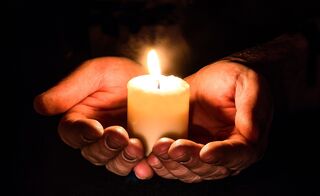Stress
Creating Hope After the Pandemic
It's easy to lose hope during challenging times, but here are some tips.
Posted May 28, 2021 Reviewed by Abigail Fagan
Key points
- Being hopeful involves cultivating compassion, empathy, and support.
- Insights from the Dalai Lama can provide valuable lessons, such as that altruism is superior to anger.
- One silver lining of the pandemic may be that it fostered a sense of connectedness around the world.

While most of us in the United States are starting to feel the cloud of the pandemic lifting, there were times during the past 16 months when many of us lost our sense of hope. The uncertainty surrounding the entire situation as well as conflicting news reports produced a great deal of anxiety and stress. While initially many of us thought that the quarantine would only last for a few months, it didn’t take us long to figure out that there was no clear end in sight.
Hope Gets Us Through Darkness
However, during times of darkness, we need to remember that hope can always get us through. Those of us who are healers know how to instill hope, but reminders are always helpful. When broaching a discussion about hope with a client, the best way to start is by asking someone what they fear most, as in: “What’s the biggest monster in your head?” This conversation elicits exploration and further deepens the conversation.
What Is Hope?
Hope is about offering a sense of compassion, empathy, and emotional support. It is ignited in the heart, where passion, perseverance, and faith meet. It’s also about creating a safe space for those who feel hopeless. And often just talking about hope is empowering, bringing about deeper self-awareness and understanding.
How to Foster Hope
Another way to foster hope in others is to shift the focus of the conversation to gratitude. We know that being grateful contributes to a sense of well-being and overall life purpose. This is particularly helpful during a pandemic, a time when depression and suicide are on the rise. Studies have shown that providing hope to suicidal individuals can help them change their perspectives and rise above debilitating thoughts.
As a man who has survived many challenging times in his life, His Holiness the Dalai Lama is someone we can turn to when we need to feel a sense of hope. In a recent conversation between him and novelist Pico Iyer through the University of California, Santa Barbara, the Dalai Lama acknowledged that the pandemic is very serious and very sad, and that we are all so afraid. “That’s not useful,” he said. He suggested that as a society, we need to attack the virus through research and science.
He stressed the idea of negative emotions being destructive, and that positive emotions such as altruism (the opposite of anger), compassion, and enthusiasm can help us overcome these difficulties. “Pay more attention to your mind,” he suggested. Also, he said that watching and reading too much news can be harmful to our psyches and that we must limit our exposure.
Thinking Positively
By thinking positively, we can say that from all bad comes good. Serious situations like a pandemic can wake us up to reality and help us see what’s important so that we can reevaluate our lives. “Difficulties help to open our mind and help us use our intelligence without losing our courage,” said the Dalai Lama. The end result is healing and transformation. He said that emotions such as anger can destroy our peace of mind and actually be counterproductive.
It’s important to consider the silver linings of the pandemic. The fact is that in many ways, it brought us all together as a global society. We became interconnected as we all dealt with the same issue of disease prevention and treatment while also trying to figure out how to survive. Suddenly, there was a common denominator among us that transcended borders. This helped us focus more on similarities than on differences, and showed us that we are at a time of transition where old structures might be dying and new ones may be emerging. In some situations, this was difficult to observe, but it was like spring cleaning, where you always feel better after decluttering.
So the next time you’re feeling stressed by the pandemic or any other seemingly overwhelming and unsolvable problem, try to summon up feelings of hope and optimism. You may find that the new perspective this creates makes everything seem a lot more palatable.


